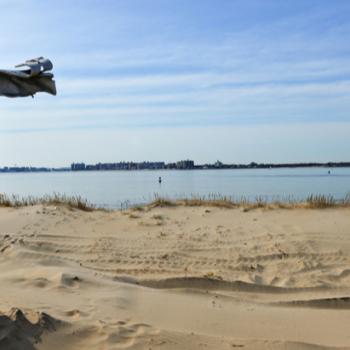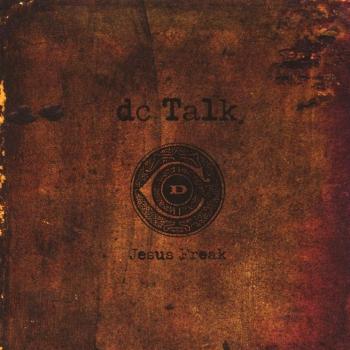
Four years ago, singer-songwriter Derek Webb released Fingers Crossed, an album exploring the emotional aftermath of his marriage’s dissolution and his breakup with Christianity. Last month, he seemed to imply that it may have been less a breakup than a break. Is it marketing? Art? Spiritual grappling? Maybe all of the above.
Derek Webb: Caedmon’s questioner
For those who only knew Derek Webb through his work with folk group Caedmon’s Call, I imagine his deconstruction was a shock. Caedmon’s was one of the most theologically thoughtful groups of the ‘90s, and those who only knew him from “Table for Two” and “Thankful” were likely shocked to learn he no longer identified as a Christian.
Those following Webb’s solo career were likely less surprised. He cultivated a personality considered prophetic by his fans and was often dismissed as an empty provocateur by his critics. He seemed to enjoy poking the bear. His questions about Christians’ place and responsibilities in the world increased with every album. For listeners wrestling with their own questions, this created solidarity. For critics, it was a slippery slope that flirted with heresy. His deconstruction and deconversion could be seen as inevitable by cynics or honest growth by his fans. I doubt Webb — who admits to a tendency of self-sabotage — would deny there was a bit of both.
Pausing the conversation
I’m a longtime fan of Webb. He’s an artist who often asked the same questions I did as I confronted my growing discomfort in Reformed and Evangelical circles. His voice helped me navigate the intersection of faith and politics. I agree that he seems to have a fondness for stirring up trouble, but I think he comes by his questions honestly. He’s sincere, even as he’s a calculated self-promoter. All of these things can be true.
I was sad when Fingers Crossed seemed to be a farewell to the faith. But I never totally bought that Webb was done with the Jesus conversation. In the years following his divorce, he remarried, to Abbie Parker, a singer with the pop worship band I Am They. The couple recently released a children’s album called Celebrate Wonder for the United Methodist Church. Webb has carefully phrased any questions about his current spiritual outlook. He’s acknowledged he’s open to anything and refuses to be pigeonholed as a believer, atheist or agnostic. I’ve always felt that titling the final song on Fingers Crossed “Goodbye for Now” signified a pause in his spiritual questions, but not necessarily an end.
Back to the white board
Now, it looks like Webb is going to restart the conversation. In May, after some cryptic Twitter hints and a website rebrand, Webb unveiled that his next album will be titled “The Jesus Hypothesis.” He’s invited his Patreon subscribers to join him as he writes music and prepares songs for the new album. “Have you ever wondered if you were wrong about the things you were wrong about,” Webb asked in a video before stating that “maybe the Jesus hypothesis is worth one more test.”
While this doesn’t announce a reconversion or reconstruction, it’s an interesting twist in Webb’s journey, and I’m sure it will be fascinating to watch it all shake out. But it also leaves me with a few questions regarding what happens when commerce, faith and art collide.
Commercialized soul-searching
When I told my wife about Webb’s latest creative endeavor, I’ll be honest that she rolled her eyes. She found it to be a cynical cash grab, a way to exploit spiritual searching.
I understand her point. As someone who works in marketing, I understand how this looks like a calculated narrative. Webb’s an independent artist. He has a large audience that likely was introduced to him because faith views, and it’s likely that some of those followers dropped off as Webb strayed from that. It’s easy to imagine this as a savvy career realignment, a way to tell audiences that “Derek Webb’s back [with Jesus], baby!” That fact that Webb’s album prior to Fingers Crossed, titled I Was Wrong, I’m Sorry, and I Love You, seemed to signal a similar return to his roots right before the train seemingly derailed also may raise a few eyebrows.
Of course, that assumes that the outcome to all this is that his answers lead back to the faith; I’m not quite sure that’s a certainty. It also ignores the idea that Webb likely has a sizable following who came to him through his deconstruction, and this risks upsetting that apple cart just as much.
And then there’s the voyeuristic element to this, in which Webb invites fans to watch him create. I think it’s a fascinating idea to let supporters into the artistic process. But when it’s attached to the idea that Webb might be rethinking questions on some of life’s deepest matters, there’s a part that could come off icky. There is very much an element in which it appears like Webb is baiting fans, telling them “For a simple price, you can watch my existential grappling.” It feels dangerous to start rethinking world views and begin coming to conclusions before an audience.
The work of artists
But that’s the constant tension of making art and a living, especially when matters of faith come into play.
Webb sees his role as telling the truth about how he views the world. I think that’s a good definition of any artist. We toss our questions on our respective canvases; our answers are the final product. While it’s tempting to think our thoughts come out fully formed, it’s often the process itself that helps us achieve clarity. Lovers pick up their guitars and work through their romances and heartbreaks. Writers noodle over their questions until they feel the answer form. It happens with love, science and philosophy. Why should faith be any different? Much of my frustration from Christian music over the years came from pat, canned and safe answers. Webb’s answers might be different than mine, but I appreciate the honest approach.
And as for the financial end of it, that’s just part of the job. I would love to say writing this blog is a purely creative act, but the truth is I hope to make a little bit of money from it. Photographers and filmmakers want to make a statement with their work, but that doesn’t necessarily preclude them from profiting. Just because the question is Jesus doesn’t mean an artist should give away the goods for free. And if they want to show their supporters how the sausage gets made, that’s within their rights.
Still listening
I have no clue what’s going on in Webb’s brain. “The Jesus Hypothesis” could turn out to be his masterpiece. Or, it could turn out to be a disaster. There’s something exciting about not knowing. Does this end with Derek Webb once again becoming a songwriter who sings about Jesus? Or does it confirm his suspicions that some things are just unknowable? I don’t know. But I’m glad he’s asking questions.
The most dangerous thing we can do in Christian culture is discourage questioning. It’s what causes people to shut down and isolate. As long as Derek Webb has questions, I want him to be throwing them at the canvas. I hope he finds answers. I may not like the ones he does. But a conversation doesn’t require agreement. Only a willingness to listen.












